Analyzing the Evolution and Impact of Contemporary Tourism Trends
VerifiedAdded on 2023/06/12
|7
|2242
|134
Essay
AI Summary
This essay provides a comprehensive analysis of contemporary tourism, examining its evolution, economic impacts, environmental consequences, and socio-cultural effects. It highlights the dynamic nature of the tourism industry and its significant role in boosting economies through revenue generation, job creation, and infrastructure development. The essay delves into both the positive and negative impacts of tourism, such as the multiplier and leakage effects on economies, and the effects on natural resources and local communities. Furthermore, it explores the socio-cultural influences, including the preservation of local heritage and potential disruptions to traditional lifestyles. The essay concludes by emphasizing the importance of sustainable tourism practices to mitigate negative impacts and ensure long-term benefits for both host countries and the environment. Desklib provides a platform for students to access this essay and other solved assignments.
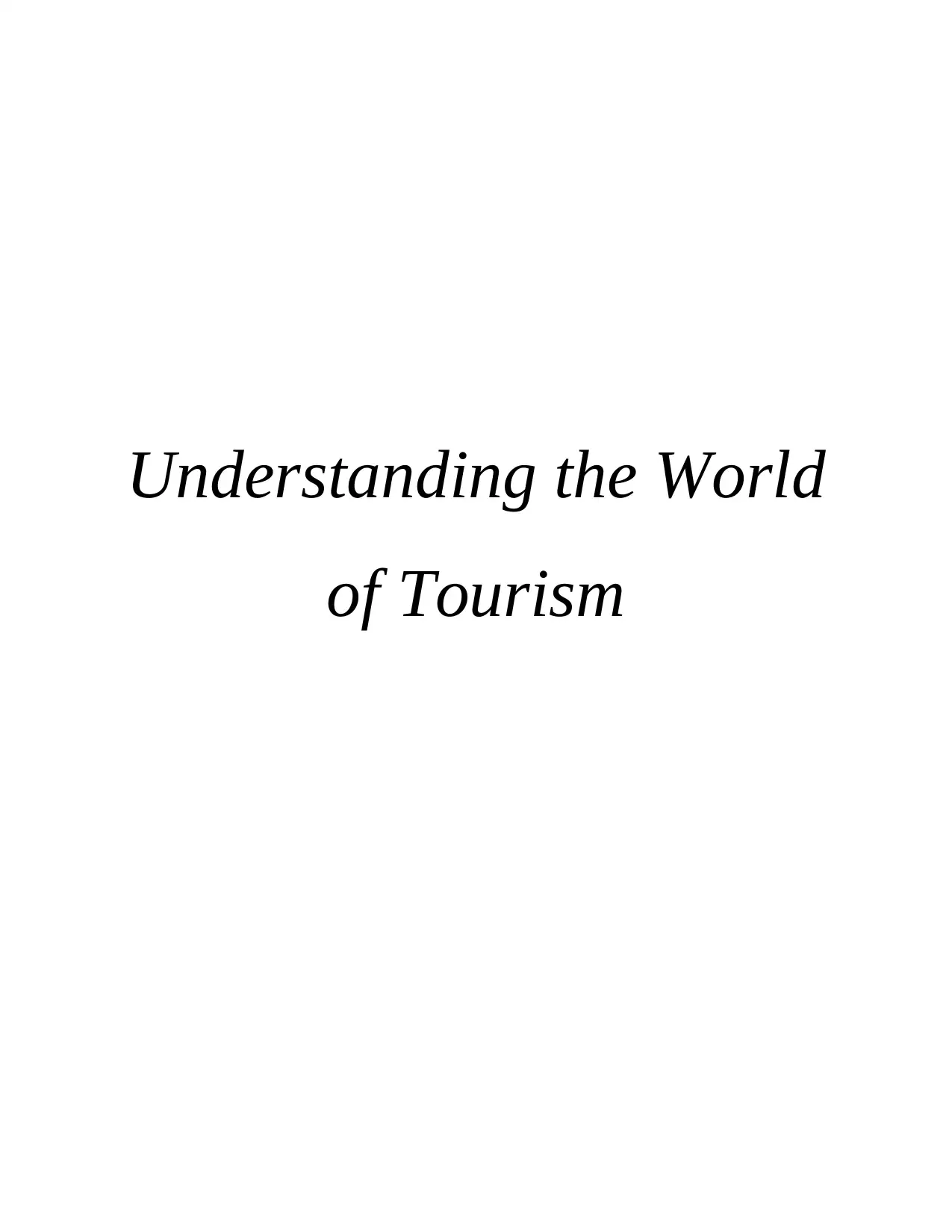
Understanding the World
of Tourism
of Tourism
Paraphrase This Document
Need a fresh take? Get an instant paraphrase of this document with our AI Paraphraser
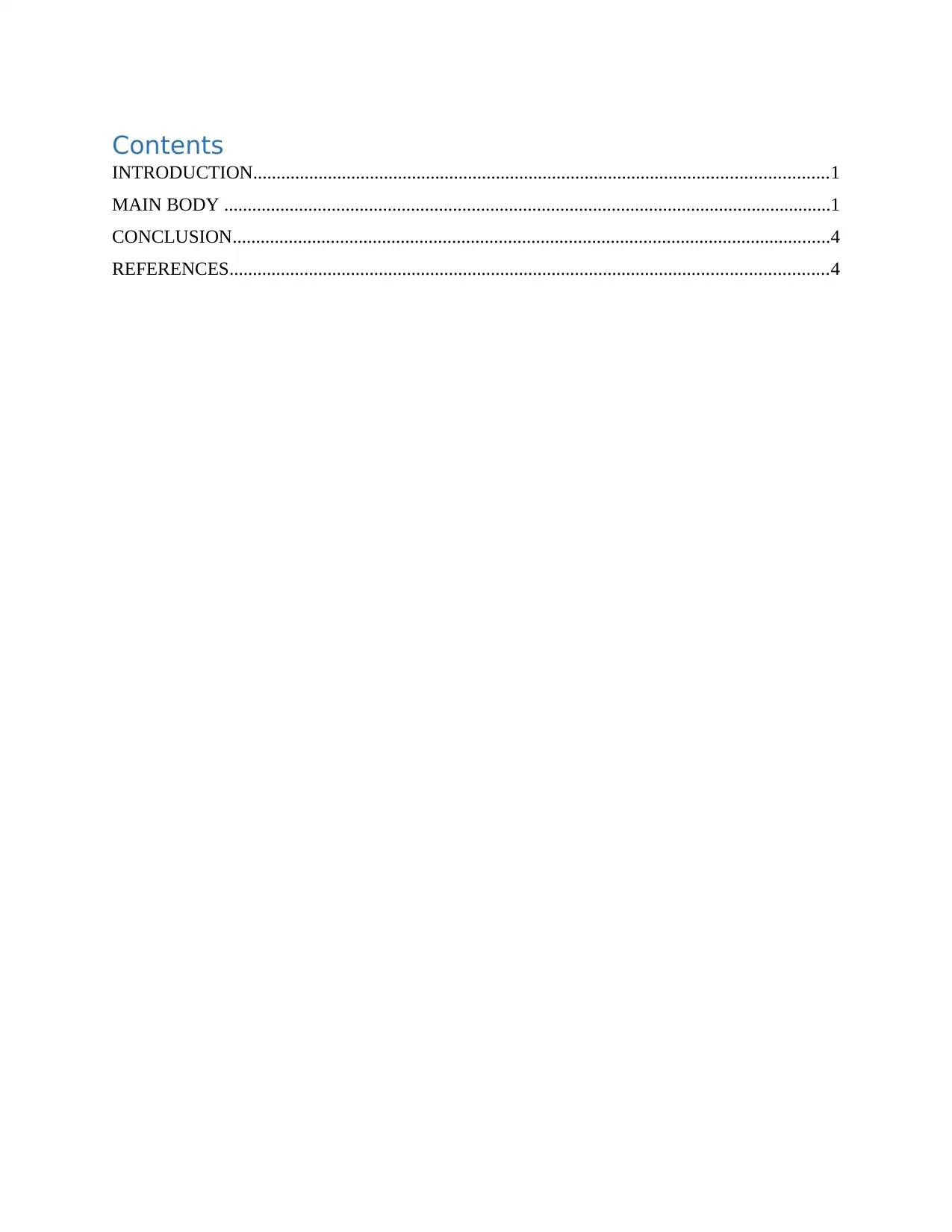
Contents
INTRODUCTION...........................................................................................................................1
MAIN BODY ..................................................................................................................................1
CONCLUSION................................................................................................................................4
REFERENCES................................................................................................................................4
INTRODUCTION...........................................................................................................................1
MAIN BODY ..................................................................................................................................1
CONCLUSION................................................................................................................................4
REFERENCES................................................................................................................................4
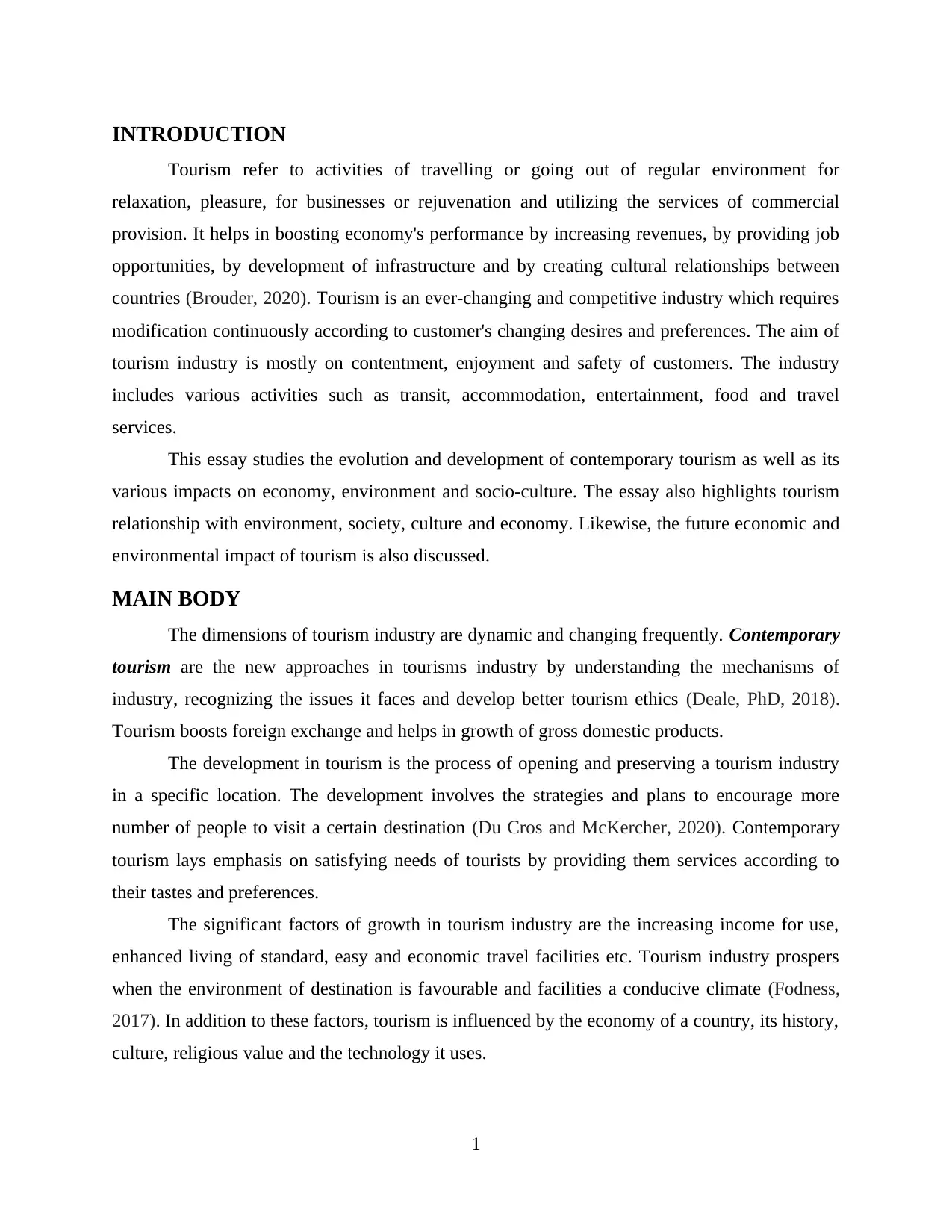
INTRODUCTION
Tourism refer to activities of travelling or going out of regular environment for
relaxation, pleasure, for businesses or rejuvenation and utilizing the services of commercial
provision. It helps in boosting economy's performance by increasing revenues, by providing job
opportunities, by development of infrastructure and by creating cultural relationships between
countries (Brouder, 2020). Tourism is an ever-changing and competitive industry which requires
modification continuously according to customer's changing desires and preferences. The aim of
tourism industry is mostly on contentment, enjoyment and safety of customers. The industry
includes various activities such as transit, accommodation, entertainment, food and travel
services.
This essay studies the evolution and development of contemporary tourism as well as its
various impacts on economy, environment and socio-culture. The essay also highlights tourism
relationship with environment, society, culture and economy. Likewise, the future economic and
environmental impact of tourism is also discussed.
MAIN BODY
The dimensions of tourism industry are dynamic and changing frequently. Contemporary
tourism are the new approaches in tourisms industry by understanding the mechanisms of
industry, recognizing the issues it faces and develop better tourism ethics (Deale, PhD, 2018).
Tourism boosts foreign exchange and helps in growth of gross domestic products.
The development in tourism is the process of opening and preserving a tourism industry
in a specific location. The development involves the strategies and plans to encourage more
number of people to visit a certain destination (Du Cros and McKercher, 2020). Contemporary
tourism lays emphasis on satisfying needs of tourists by providing them services according to
their tastes and preferences.
The significant factors of growth in tourism industry are the increasing income for use,
enhanced living of standard, easy and economic travel facilities etc. Tourism industry prospers
when the environment of destination is favourable and facilities a conducive climate (Fodness,
2017). In addition to these factors, tourism is influenced by the economy of a country, its history,
culture, religious value and the technology it uses.
1
Tourism refer to activities of travelling or going out of regular environment for
relaxation, pleasure, for businesses or rejuvenation and utilizing the services of commercial
provision. It helps in boosting economy's performance by increasing revenues, by providing job
opportunities, by development of infrastructure and by creating cultural relationships between
countries (Brouder, 2020). Tourism is an ever-changing and competitive industry which requires
modification continuously according to customer's changing desires and preferences. The aim of
tourism industry is mostly on contentment, enjoyment and safety of customers. The industry
includes various activities such as transit, accommodation, entertainment, food and travel
services.
This essay studies the evolution and development of contemporary tourism as well as its
various impacts on economy, environment and socio-culture. The essay also highlights tourism
relationship with environment, society, culture and economy. Likewise, the future economic and
environmental impact of tourism is also discussed.
MAIN BODY
The dimensions of tourism industry are dynamic and changing frequently. Contemporary
tourism are the new approaches in tourisms industry by understanding the mechanisms of
industry, recognizing the issues it faces and develop better tourism ethics (Deale, PhD, 2018).
Tourism boosts foreign exchange and helps in growth of gross domestic products.
The development in tourism is the process of opening and preserving a tourism industry
in a specific location. The development involves the strategies and plans to encourage more
number of people to visit a certain destination (Du Cros and McKercher, 2020). Contemporary
tourism lays emphasis on satisfying needs of tourists by providing them services according to
their tastes and preferences.
The significant factors of growth in tourism industry are the increasing income for use,
enhanced living of standard, easy and economic travel facilities etc. Tourism industry prospers
when the environment of destination is favourable and facilities a conducive climate (Fodness,
2017). In addition to these factors, tourism is influenced by the economy of a country, its history,
culture, religious value and the technology it uses.
1
⊘ This is a preview!⊘
Do you want full access?
Subscribe today to unlock all pages.

Trusted by 1+ million students worldwide
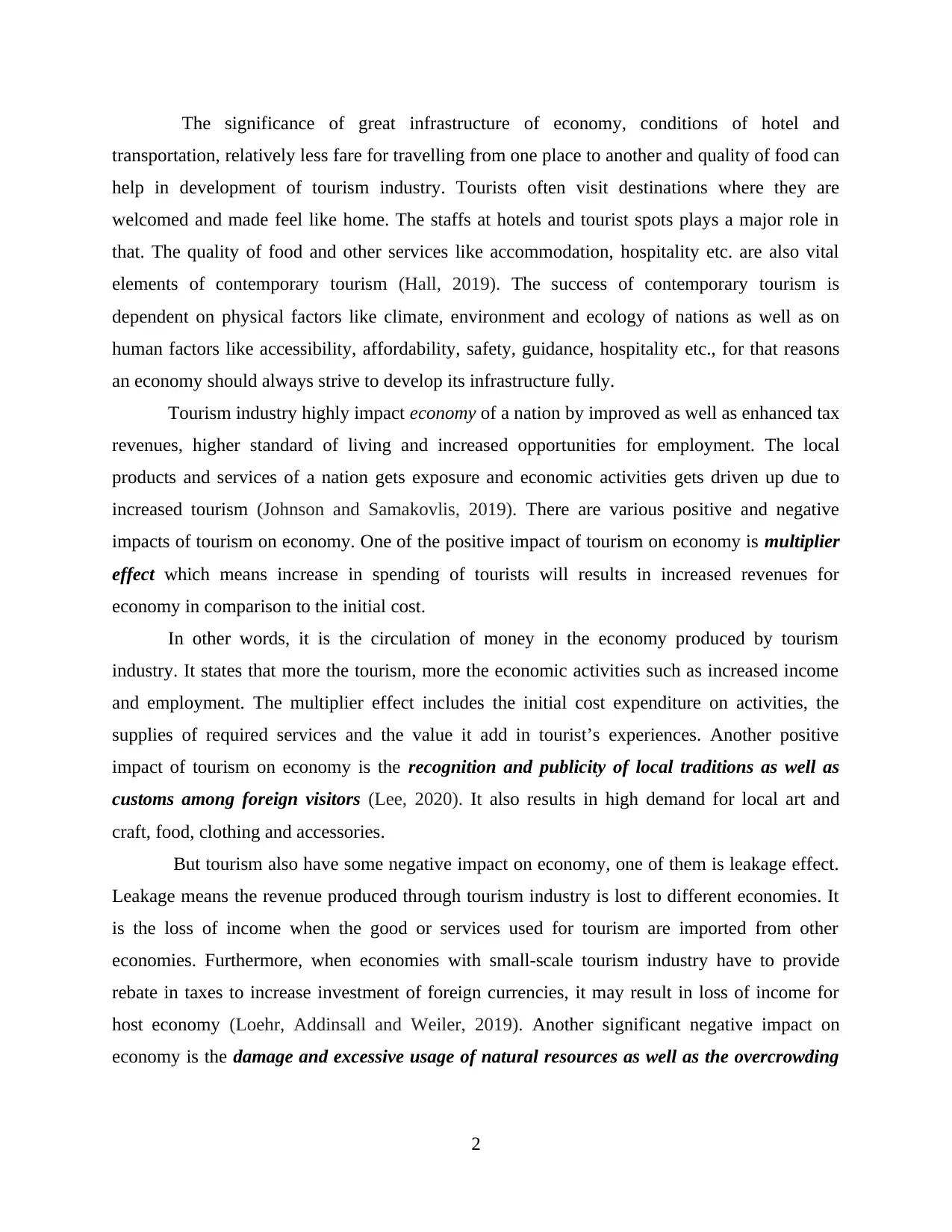
The significance of great infrastructure of economy, conditions of hotel and
transportation, relatively less fare for travelling from one place to another and quality of food can
help in development of tourism industry. Tourists often visit destinations where they are
welcomed and made feel like home. The staffs at hotels and tourist spots plays a major role in
that. The quality of food and other services like accommodation, hospitality etc. are also vital
elements of contemporary tourism (Hall, 2019). The success of contemporary tourism is
dependent on physical factors like climate, environment and ecology of nations as well as on
human factors like accessibility, affordability, safety, guidance, hospitality etc., for that reasons
an economy should always strive to develop its infrastructure fully.
Tourism industry highly impact economy of a nation by improved as well as enhanced tax
revenues, higher standard of living and increased opportunities for employment. The local
products and services of a nation gets exposure and economic activities gets driven up due to
increased tourism (Johnson and Samakovlis, 2019). There are various positive and negative
impacts of tourism on economy. One of the positive impact of tourism on economy is multiplier
effect which means increase in spending of tourists will results in increased revenues for
economy in comparison to the initial cost.
In other words, it is the circulation of money in the economy produced by tourism
industry. It states that more the tourism, more the economic activities such as increased income
and employment. The multiplier effect includes the initial cost expenditure on activities, the
supplies of required services and the value it add in tourist’s experiences. Another positive
impact of tourism on economy is the recognition and publicity of local traditions as well as
customs among foreign visitors (Lee, 2020). It also results in high demand for local art and
craft, food, clothing and accessories.
But tourism also have some negative impact on economy, one of them is leakage effect.
Leakage means the revenue produced through tourism industry is lost to different economies. It
is the loss of income when the good or services used for tourism are imported from other
economies. Furthermore, when economies with small-scale tourism industry have to provide
rebate in taxes to increase investment of foreign currencies, it may result in loss of income for
host economy (Loehr, Addinsall and Weiler, 2019). Another significant negative impact on
economy is the damage and excessive usage of natural resources as well as the overcrowding
2
transportation, relatively less fare for travelling from one place to another and quality of food can
help in development of tourism industry. Tourists often visit destinations where they are
welcomed and made feel like home. The staffs at hotels and tourist spots plays a major role in
that. The quality of food and other services like accommodation, hospitality etc. are also vital
elements of contemporary tourism (Hall, 2019). The success of contemporary tourism is
dependent on physical factors like climate, environment and ecology of nations as well as on
human factors like accessibility, affordability, safety, guidance, hospitality etc., for that reasons
an economy should always strive to develop its infrastructure fully.
Tourism industry highly impact economy of a nation by improved as well as enhanced tax
revenues, higher standard of living and increased opportunities for employment. The local
products and services of a nation gets exposure and economic activities gets driven up due to
increased tourism (Johnson and Samakovlis, 2019). There are various positive and negative
impacts of tourism on economy. One of the positive impact of tourism on economy is multiplier
effect which means increase in spending of tourists will results in increased revenues for
economy in comparison to the initial cost.
In other words, it is the circulation of money in the economy produced by tourism
industry. It states that more the tourism, more the economic activities such as increased income
and employment. The multiplier effect includes the initial cost expenditure on activities, the
supplies of required services and the value it add in tourist’s experiences. Another positive
impact of tourism on economy is the recognition and publicity of local traditions as well as
customs among foreign visitors (Lee, 2020). It also results in high demand for local art and
craft, food, clothing and accessories.
But tourism also have some negative impact on economy, one of them is leakage effect.
Leakage means the revenue produced through tourism industry is lost to different economies. It
is the loss of income when the good or services used for tourism are imported from other
economies. Furthermore, when economies with small-scale tourism industry have to provide
rebate in taxes to increase investment of foreign currencies, it may result in loss of income for
host economy (Loehr, Addinsall and Weiler, 2019). Another significant negative impact on
economy is the damage and excessive usage of natural resources as well as the overcrowding
2
Paraphrase This Document
Need a fresh take? Get an instant paraphrase of this document with our AI Paraphraser
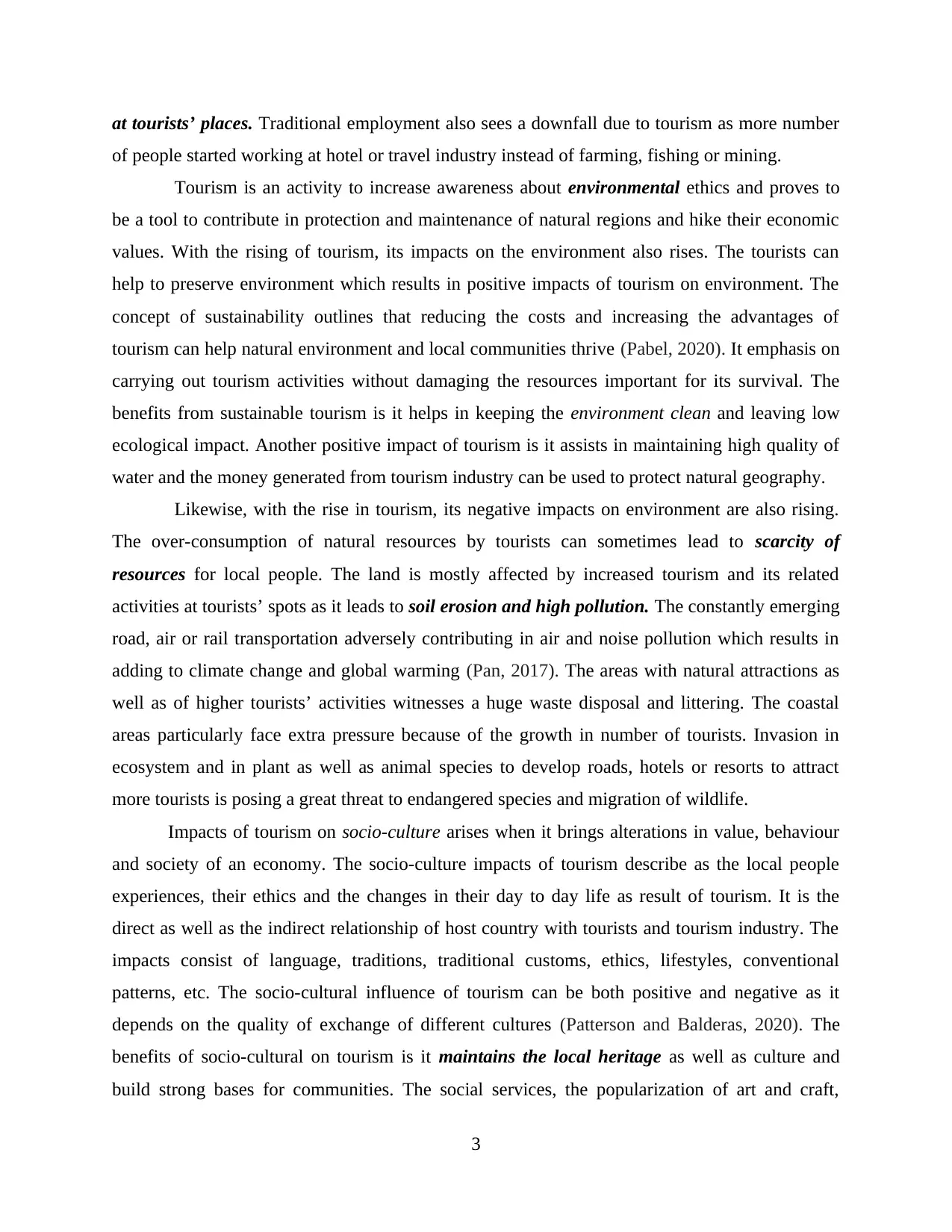
at tourists’ places. Traditional employment also sees a downfall due to tourism as more number
of people started working at hotel or travel industry instead of farming, fishing or mining.
Tourism is an activity to increase awareness about environmental ethics and proves to
be a tool to contribute in protection and maintenance of natural regions and hike their economic
values. With the rising of tourism, its impacts on the environment also rises. The tourists can
help to preserve environment which results in positive impacts of tourism on environment. The
concept of sustainability outlines that reducing the costs and increasing the advantages of
tourism can help natural environment and local communities thrive (Pabel, 2020). It emphasis on
carrying out tourism activities without damaging the resources important for its survival. The
benefits from sustainable tourism is it helps in keeping the environment clean and leaving low
ecological impact. Another positive impact of tourism is it assists in maintaining high quality of
water and the money generated from tourism industry can be used to protect natural geography.
Likewise, with the rise in tourism, its negative impacts on environment are also rising.
The over-consumption of natural resources by tourists can sometimes lead to scarcity of
resources for local people. The land is mostly affected by increased tourism and its related
activities at tourists’ spots as it leads to soil erosion and high pollution. The constantly emerging
road, air or rail transportation adversely contributing in air and noise pollution which results in
adding to climate change and global warming (Pan, 2017). The areas with natural attractions as
well as of higher tourists’ activities witnesses a huge waste disposal and littering. The coastal
areas particularly face extra pressure because of the growth in number of tourists. Invasion in
ecosystem and in plant as well as animal species to develop roads, hotels or resorts to attract
more tourists is posing a great threat to endangered species and migration of wildlife.
Impacts of tourism on socio-culture arises when it brings alterations in value, behaviour
and society of an economy. The socio-culture impacts of tourism describe as the local people
experiences, their ethics and the changes in their day to day life as result of tourism. It is the
direct as well as the indirect relationship of host country with tourists and tourism industry. The
impacts consist of language, traditions, traditional customs, ethics, lifestyles, conventional
patterns, etc. The socio-cultural influence of tourism can be both positive and negative as it
depends on the quality of exchange of different cultures (Patterson and Balderas, 2020). The
benefits of socio-cultural on tourism is it maintains the local heritage as well as culture and
build strong bases for communities. The social services, the popularization of art and craft,
3
of people started working at hotel or travel industry instead of farming, fishing or mining.
Tourism is an activity to increase awareness about environmental ethics and proves to
be a tool to contribute in protection and maintenance of natural regions and hike their economic
values. With the rising of tourism, its impacts on the environment also rises. The tourists can
help to preserve environment which results in positive impacts of tourism on environment. The
concept of sustainability outlines that reducing the costs and increasing the advantages of
tourism can help natural environment and local communities thrive (Pabel, 2020). It emphasis on
carrying out tourism activities without damaging the resources important for its survival. The
benefits from sustainable tourism is it helps in keeping the environment clean and leaving low
ecological impact. Another positive impact of tourism is it assists in maintaining high quality of
water and the money generated from tourism industry can be used to protect natural geography.
Likewise, with the rise in tourism, its negative impacts on environment are also rising.
The over-consumption of natural resources by tourists can sometimes lead to scarcity of
resources for local people. The land is mostly affected by increased tourism and its related
activities at tourists’ spots as it leads to soil erosion and high pollution. The constantly emerging
road, air or rail transportation adversely contributing in air and noise pollution which results in
adding to climate change and global warming (Pan, 2017). The areas with natural attractions as
well as of higher tourists’ activities witnesses a huge waste disposal and littering. The coastal
areas particularly face extra pressure because of the growth in number of tourists. Invasion in
ecosystem and in plant as well as animal species to develop roads, hotels or resorts to attract
more tourists is posing a great threat to endangered species and migration of wildlife.
Impacts of tourism on socio-culture arises when it brings alterations in value, behaviour
and society of an economy. The socio-culture impacts of tourism describe as the local people
experiences, their ethics and the changes in their day to day life as result of tourism. It is the
direct as well as the indirect relationship of host country with tourists and tourism industry. The
impacts consist of language, traditions, traditional customs, ethics, lifestyles, conventional
patterns, etc. The socio-cultural influence of tourism can be both positive and negative as it
depends on the quality of exchange of different cultures (Patterson and Balderas, 2020). The
benefits of socio-cultural on tourism is it maintains the local heritage as well as culture and
build strong bases for communities. The social services, the popularization of art and craft,
3
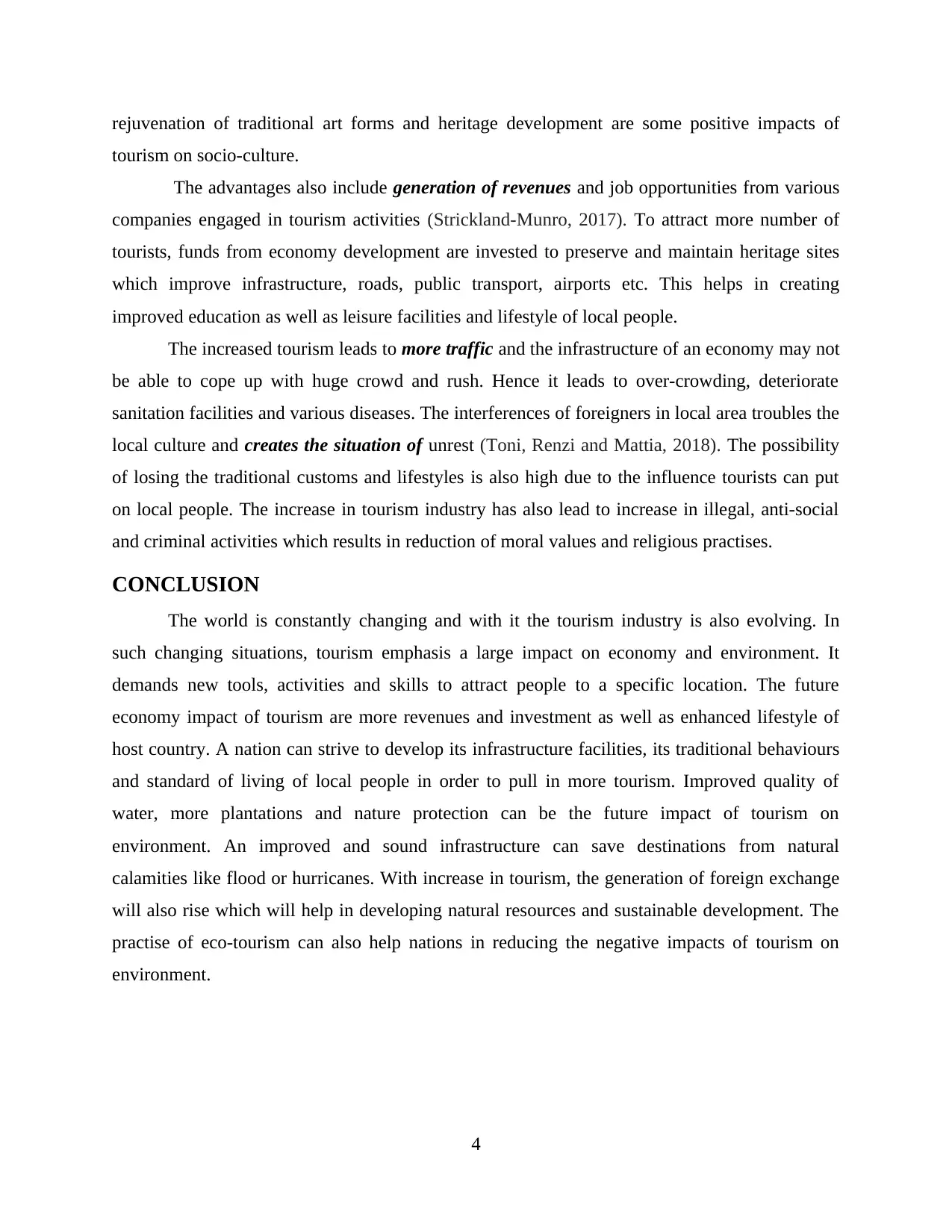
rejuvenation of traditional art forms and heritage development are some positive impacts of
tourism on socio-culture.
The advantages also include generation of revenues and job opportunities from various
companies engaged in tourism activities (Strickland-Munro, 2017). To attract more number of
tourists, funds from economy development are invested to preserve and maintain heritage sites
which improve infrastructure, roads, public transport, airports etc. This helps in creating
improved education as well as leisure facilities and lifestyle of local people.
The increased tourism leads to more traffic and the infrastructure of an economy may not
be able to cope up with huge crowd and rush. Hence it leads to over-crowding, deteriorate
sanitation facilities and various diseases. The interferences of foreigners in local area troubles the
local culture and creates the situation of unrest (Toni, Renzi and Mattia, 2018). The possibility
of losing the traditional customs and lifestyles is also high due to the influence tourists can put
on local people. The increase in tourism industry has also lead to increase in illegal, anti-social
and criminal activities which results in reduction of moral values and religious practises.
CONCLUSION
The world is constantly changing and with it the tourism industry is also evolving. In
such changing situations, tourism emphasis a large impact on economy and environment. It
demands new tools, activities and skills to attract people to a specific location. The future
economy impact of tourism are more revenues and investment as well as enhanced lifestyle of
host country. A nation can strive to develop its infrastructure facilities, its traditional behaviours
and standard of living of local people in order to pull in more tourism. Improved quality of
water, more plantations and nature protection can be the future impact of tourism on
environment. An improved and sound infrastructure can save destinations from natural
calamities like flood or hurricanes. With increase in tourism, the generation of foreign exchange
will also rise which will help in developing natural resources and sustainable development. The
practise of eco-tourism can also help nations in reducing the negative impacts of tourism on
environment.
4
tourism on socio-culture.
The advantages also include generation of revenues and job opportunities from various
companies engaged in tourism activities (Strickland-Munro, 2017). To attract more number of
tourists, funds from economy development are invested to preserve and maintain heritage sites
which improve infrastructure, roads, public transport, airports etc. This helps in creating
improved education as well as leisure facilities and lifestyle of local people.
The increased tourism leads to more traffic and the infrastructure of an economy may not
be able to cope up with huge crowd and rush. Hence it leads to over-crowding, deteriorate
sanitation facilities and various diseases. The interferences of foreigners in local area troubles the
local culture and creates the situation of unrest (Toni, Renzi and Mattia, 2018). The possibility
of losing the traditional customs and lifestyles is also high due to the influence tourists can put
on local people. The increase in tourism industry has also lead to increase in illegal, anti-social
and criminal activities which results in reduction of moral values and religious practises.
CONCLUSION
The world is constantly changing and with it the tourism industry is also evolving. In
such changing situations, tourism emphasis a large impact on economy and environment. It
demands new tools, activities and skills to attract people to a specific location. The future
economy impact of tourism are more revenues and investment as well as enhanced lifestyle of
host country. A nation can strive to develop its infrastructure facilities, its traditional behaviours
and standard of living of local people in order to pull in more tourism. Improved quality of
water, more plantations and nature protection can be the future impact of tourism on
environment. An improved and sound infrastructure can save destinations from natural
calamities like flood or hurricanes. With increase in tourism, the generation of foreign exchange
will also rise which will help in developing natural resources and sustainable development. The
practise of eco-tourism can also help nations in reducing the negative impacts of tourism on
environment.
4
⊘ This is a preview!⊘
Do you want full access?
Subscribe today to unlock all pages.

Trusted by 1+ million students worldwide
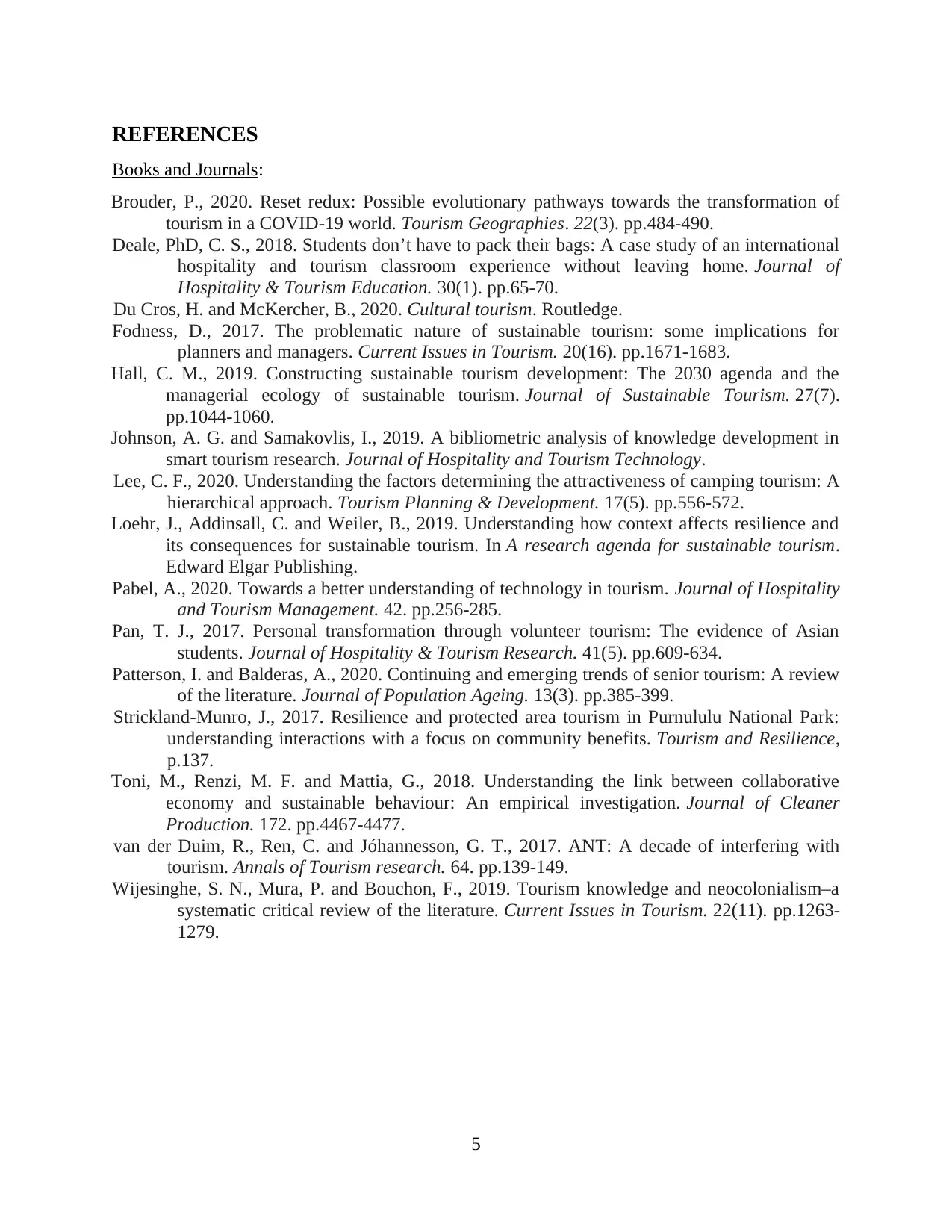
REFERENCES
Books and Journals:
Brouder, P., 2020. Reset redux: Possible evolutionary pathways towards the transformation of
tourism in a COVID-19 world. Tourism Geographies. 22(3). pp.484-490.
Deale, PhD, C. S., 2018. Students don’t have to pack their bags: A case study of an international
hospitality and tourism classroom experience without leaving home. Journal of
Hospitality & Tourism Education. 30(1). pp.65-70.
Du Cros, H. and McKercher, B., 2020. Cultural tourism. Routledge.
Fodness, D., 2017. The problematic nature of sustainable tourism: some implications for
planners and managers. Current Issues in Tourism. 20(16). pp.1671-1683.
Hall, C. M., 2019. Constructing sustainable tourism development: The 2030 agenda and the
managerial ecology of sustainable tourism. Journal of Sustainable Tourism. 27(7).
pp.1044-1060.
Johnson, A. G. and Samakovlis, I., 2019. A bibliometric analysis of knowledge development in
smart tourism research. Journal of Hospitality and Tourism Technology.
Lee, C. F., 2020. Understanding the factors determining the attractiveness of camping tourism: A
hierarchical approach. Tourism Planning & Development. 17(5). pp.556-572.
Loehr, J., Addinsall, C. and Weiler, B., 2019. Understanding how context affects resilience and
its consequences for sustainable tourism. In A research agenda for sustainable tourism.
Edward Elgar Publishing.
Pabel, A., 2020. Towards a better understanding of technology in tourism. Journal of Hospitality
and Tourism Management. 42. pp.256-285.
Pan, T. J., 2017. Personal transformation through volunteer tourism: The evidence of Asian
students. Journal of Hospitality & Tourism Research. 41(5). pp.609-634.
Patterson, I. and Balderas, A., 2020. Continuing and emerging trends of senior tourism: A review
of the literature. Journal of Population Ageing. 13(3). pp.385-399.
Strickland-Munro, J., 2017. Resilience and protected area tourism in Purnululu National Park:
understanding interactions with a focus on community benefits. Tourism and Resilience,
p.137.
Toni, M., Renzi, M. F. and Mattia, G., 2018. Understanding the link between collaborative
economy and sustainable behaviour: An empirical investigation. Journal of Cleaner
Production. 172. pp.4467-4477.
van der Duim, R., Ren, C. and Jóhannesson, G. T., 2017. ANT: A decade of interfering with
tourism. Annals of Tourism research. 64. pp.139-149.
Wijesinghe, S. N., Mura, P. and Bouchon, F., 2019. Tourism knowledge and neocolonialism–a
systematic critical review of the literature. Current Issues in Tourism. 22(11). pp.1263-
1279.
5
Books and Journals:
Brouder, P., 2020. Reset redux: Possible evolutionary pathways towards the transformation of
tourism in a COVID-19 world. Tourism Geographies. 22(3). pp.484-490.
Deale, PhD, C. S., 2018. Students don’t have to pack their bags: A case study of an international
hospitality and tourism classroom experience without leaving home. Journal of
Hospitality & Tourism Education. 30(1). pp.65-70.
Du Cros, H. and McKercher, B., 2020. Cultural tourism. Routledge.
Fodness, D., 2017. The problematic nature of sustainable tourism: some implications for
planners and managers. Current Issues in Tourism. 20(16). pp.1671-1683.
Hall, C. M., 2019. Constructing sustainable tourism development: The 2030 agenda and the
managerial ecology of sustainable tourism. Journal of Sustainable Tourism. 27(7).
pp.1044-1060.
Johnson, A. G. and Samakovlis, I., 2019. A bibliometric analysis of knowledge development in
smart tourism research. Journal of Hospitality and Tourism Technology.
Lee, C. F., 2020. Understanding the factors determining the attractiveness of camping tourism: A
hierarchical approach. Tourism Planning & Development. 17(5). pp.556-572.
Loehr, J., Addinsall, C. and Weiler, B., 2019. Understanding how context affects resilience and
its consequences for sustainable tourism. In A research agenda for sustainable tourism.
Edward Elgar Publishing.
Pabel, A., 2020. Towards a better understanding of technology in tourism. Journal of Hospitality
and Tourism Management. 42. pp.256-285.
Pan, T. J., 2017. Personal transformation through volunteer tourism: The evidence of Asian
students. Journal of Hospitality & Tourism Research. 41(5). pp.609-634.
Patterson, I. and Balderas, A., 2020. Continuing and emerging trends of senior tourism: A review
of the literature. Journal of Population Ageing. 13(3). pp.385-399.
Strickland-Munro, J., 2017. Resilience and protected area tourism in Purnululu National Park:
understanding interactions with a focus on community benefits. Tourism and Resilience,
p.137.
Toni, M., Renzi, M. F. and Mattia, G., 2018. Understanding the link between collaborative
economy and sustainable behaviour: An empirical investigation. Journal of Cleaner
Production. 172. pp.4467-4477.
van der Duim, R., Ren, C. and Jóhannesson, G. T., 2017. ANT: A decade of interfering with
tourism. Annals of Tourism research. 64. pp.139-149.
Wijesinghe, S. N., Mura, P. and Bouchon, F., 2019. Tourism knowledge and neocolonialism–a
systematic critical review of the literature. Current Issues in Tourism. 22(11). pp.1263-
1279.
5
1 out of 7
Related Documents
Your All-in-One AI-Powered Toolkit for Academic Success.
+13062052269
info@desklib.com
Available 24*7 on WhatsApp / Email
![[object Object]](/_next/static/media/star-bottom.7253800d.svg)
Unlock your academic potential
Copyright © 2020–2026 A2Z Services. All Rights Reserved. Developed and managed by ZUCOL.

